
by Kasia | Sep 22, 2017 | Writing
Happy Friday my dear readers and friends!

I love Fridays. It’s the first day of my long weekend every week. And while I’d love to say I’m always super productive, it doesn’t always happen that way.
Generally, the day is spent with my son. We go to the park or beach, most often than not we enjoy a coffee (him a babyccino) and sometimes we bake or arrange a playdate amongst the fifty other things I need to get done. I usually manage my run before the world wakes up, and sometimes I even let myself out for dinner and drinks once evening comes.
This morning it’s just before 6 am and the household is still sleeping as I write snuggled underneath the duvet, the birds are chirping outside, I can just barely hear the hum of the cars on the highway, and spring is in the air.
How do you like spending your Fridays?
FRIDAY LINK LOVE JUST FOR YOU
Want some new markets to approach? Here is a list of parenting and family markets that might need your knowledge and expertise – 27 Parenting and Family Magazines That Pay Writers. I know I’ll be checking them out and pitching during the weekend.
Need an excuse to binge watch some more Netflix this weekend? Joanna Penn writes about the benefits of watching television for writers – How Watching TV and Movies The Right Way Can Revolutionise Your Writing. I’m currently bingeing on Grimm and Outlander.
Ever considered being a Virtual Assistant? Work from anywhere anytime. Gina at Horkey Handbook gives you 10 Strategies to Find Your Dream Virtual Assistant Job.
Do you like to write creatively without making stuff up? Check out these 21 Magazines Currently Seeking Creative Non-Fiction.
Are you looking after your health and fitness as a writer? You can read my top 10 Tips To Help Writers Stay Fit & Healthy.
Well, that’s it from me today.
Hope you have a great Friday and a fantastic weekend!

by Kasia | Sep 4, 2017 | Writing
Are you a healthy writer? If you want longevity in your writing career you need to look after your health and fitness.
Healthy + writer. Not exactly what you picture, right?
I’m writing this whilst I stuff my face with a Jaffa biscuit. As long as the words keep flowing, I allow an occasional treat. Unfortunately, I’ve been giving myself too many treats of late and it’s doing zero favours for my well-being.
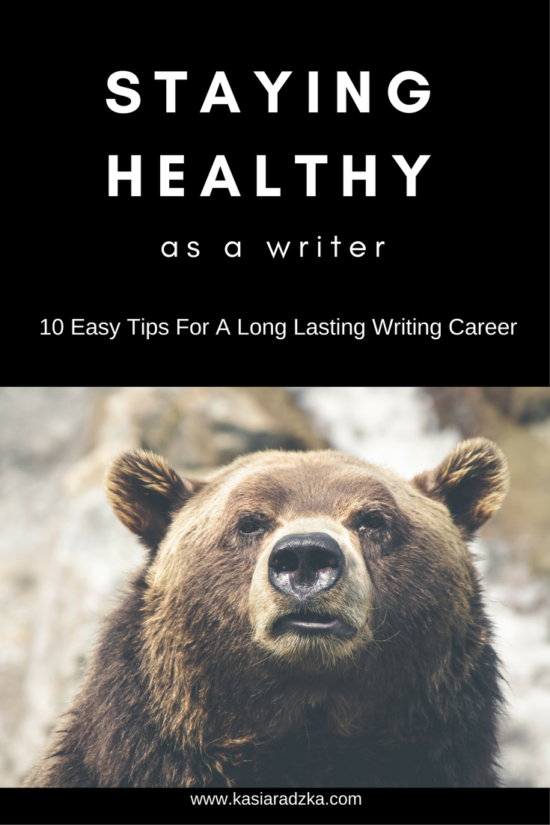
As a writer, I spend a lot of time sitting on my backside. The same goes for my day job.
So in a twenty-four hour period, I can easily spend between ten and twelve hours sitting on my butt. That’s not cool. Especially, when I start adding the chocolate, Jaffa biscuits, cheese and wine that I like to treat myself with each week.
Sooner or later, my body and mind are going to rebel. My work will suffer. The longevity of my writing will be threatened.
I want to be a healthy writer for the long term.
Don’t you?
If so, it’s important you start taking care of your health.
Studies suggest that sitting down for long periods of time is almost as bad as smoking. I can see the truth in that. After a few hours of sitting, I start feeling like crap.
Our bodies weren’t created for sitting for the majority of our lives. They were meant for moving. But add up the sitting of 8 hours a day, five days a week and you’re looking at 2080 hours a year or over 62,000 hours over 30 years or 7 years of your life on your ass and we haven’t even accounted for the time we spend in front of the idiot box, socialising over dinner or commuting.
Now doesn’t that paint a pretty picture?
A standing desk could be an option to counteract the effects of sitting, one attached to a treadmill would be even better.
But that’s not enough.
Doctors recommend approximately 30 minutes a day of physical activity. Thirty minutes is better than nothing but it’s not enough if you’re spending the majority of your day sitting down behind a computer screen.
You need to find a physical activity that you love doing and want to spend several hours each week taking part in it.
Throughout the year I like signing up for fun runs, marathons, and triathlons. These commitments help me remain accountable and ensure I get enough physical activity each week.
Combining running, swimming, cycling, weight training and yoga into my week means that I’m less likely to get bored and more likely to keep training and stay fit – they also help counteract all the chocolate I eat and wine I drink (at least that’s what I tell myself!)
Yes, there are weeks where I just say, ‘screw it’, and manage one run.
Then there are the weeks where I can comfortably fit in ten hours of training.
I like those weeks best.
During those weeks I write more too. I sleep better. And I’m much nicer to be around.
That’s just one more reason to get physical.
What are some health issues writers are at risk of?
Writers – no thanks to the type of work they do – spending their days mostly sitting, staring at a computer and typing away on a keyboard, this means that writers have a higher risk of certain health ailments, including but not limited to;
* Carpal tunnel syndrome
* Obesity
* Blocked arteries
* Hemorrhoids
* Bad back
* Neck pain
* Vision problems
The severity and seriousness of these vary but regardless, you want to avoid all of them as much as possible.
The good news is that most of them can be prevented to some degree especially when you take responsibility and initiative from the get go.

10 TIPS TO HELP WRITERS STAY FIT & HEALTHY
1. Take 30 minutes each morning to go for a walk before your writing session.
Use it as an opportunity to think about what you want to write. It’s an active brainstorming session that will get your heart pumping and your upcoming writing session much more productive.
2. Take up a team sport for motivation and accountability.
It might have nothing to do with writing but it will give you accountability to get moving a few times a week and prevent you from becoming a hermit. New friends, new opportunities, new ideas for your writing.
3. Sign up for a 5km or a marathon and learn to run.
I love running. Not everyone does. But once you actually get started running is a great option for writers because it can be done anytime and anywhere. It’s also free and accessible to almost everyone.
4. Try yoga – even ten minutes a day can make a difference.
You spend your time writing in an unnatural position, often hunched over a keyboard, taxing your entire body. A bit of yoga every day can lengthen and strengthen your limbs and alleviate any niggles that might be bothering you. Start with ten minutes a day and you’ll feel the difference within a few short weeks.
5. Hire a personal trainer and commit to one or two weight sessions each week.
Yes, even once a week with a good trainer will make a difference to your physical well being. Weight training is a great way for a writer to get full body strength as well as work on core work that will support the hours you spend sitting at your desk.
6. Even spending five minutes every hour doing a quick circuit workout will get your blood pumping, burn calories, and make your skin glow.
If you lack the time or money, or simply don’t like the idea of a gym, take five minutes every hour to get on the floor and do a quick circuit workout. This is my favourite mini workout:
10 push ups
20 squats
10 dips
15 burpees
20 crunches
30-second plank
Repeat 2-3 times
7. Improve your eating habits by ensuring you get enough of the red, green, blue and yellow.
Always aim to colour your plate. It helps if you love vegetables. Brussel sprouts are one of my favourites. There’s only one vegetable I won’t eat and that’s celery. One of my favourite ‘healthy snacks’ is chopping up carrot and cucumber sticks and dipping them into jalapeno flavoured hummus. Yummy!
8. Add fruit to your breakfast.
There’s a lot of controversy around fruit and its sugar content. At the end of the day if you’re going to eat sugar it’s better off coming from a piece of fruit than a Mars Bar or a can of Cola. Strawberries, blueberries, and raspberries are great low sugar options. Enjoy an apple a day. Bananas are rich in B vitamins and potassium. I used to eat oats with sliced up fruit for breakfast during the work week but now I’ve shifted to just eating fruit. My breakfast of choice during the work week at the moment is a punnet of strawberries, apple, and banana plus a cup of coffee with a pinch of milk.
9. Include a cup of vegetables with your lunch and dinner.
The recommended daily dose of vegetables is 5 serves. Chances are you’re barely getting one. Opt for a salad for lunch and steamed vegetables or a vegetarian stir fry for dinner. It doesn’t have to be dull. Add your favourite cut of meat, a piece of fish or some tofu, dress it up with half a cup of quinoa or black rice or a handful of slivered almonds or some sesame seeds.
10. Follow your characters physical footsteps
Is your character into martial arts? Why not sign up for a few krav maga lessons. You’ll not only learn a thing or two but also add authenticity to your writing when describing any fighting scenes.
Other fun physical activities could include archery, rock climbing, pole dancing, hiking, shooting, tai chi, horse riding or CrossFit. Don’t limit yourself. If you have the opportunity give it all a go. You might be surprised at what you enjoy doing.
It might be easier to grab a packet of crisps and a chocolate bar in the short term, but long term wise you’re going to be better off taking the time to fix yourself up a healthy meal, cutting up some veggies or walking the extra mile.
Staying healthy as a writer doesn’t have to be difficult. It’s the little things that you do every day that will make a difference to your health and well-being. Forget the quick fixes and crazy diets. Start with a small change and build on it each week. Before you know it you’ll have developed healthy habits for life and build a long lasting writing career.
Are you a healthy writer? Do you fill up on fruit and vegetables? What are some of your favourite ways to stay active? Does it help or hinder your writing?
*Remember to always consult your health professional before commencing a new diet or exercise program. This article is for informational and entertainment purposes only and should not be constituted as personal advice.
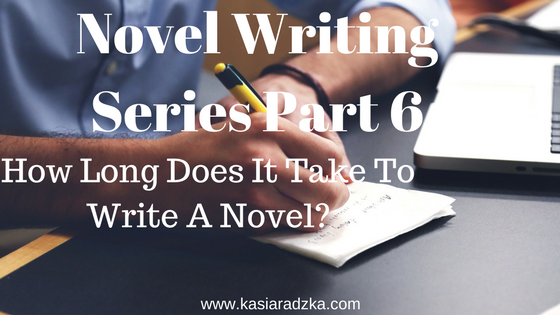
by Kasia | Aug 13, 2017 | Writing
Q: How long does it take to write a novel?
A: However long it takes you.
A year. Six months. Twelve weeks. Ten days. Twenty-four hours.
It’s the same as asking how long is a piece of string. It all depends on where you cut it, right?
Writing a novel is a time-consuming exercise.
No matter what anyone tells you, you’re not going to have a novel ready for publication overnight. It just isn’t going to happen.
Sure it’s possible, 24 hours in a day and a writing pace of 2500 words per hour. You could get a draft.
But it’s not realistic nor probable.
There are prolific writers who churn out a book every 45 days (think Nora Roberts aka JD Robb).
Then there are those who might put one book every year or two (Patricia Cornwell, Lee Child).
There are indie authors who write several books a year (Mark Dawson, Bella Andre, Russell Blake).
And then there’s you.
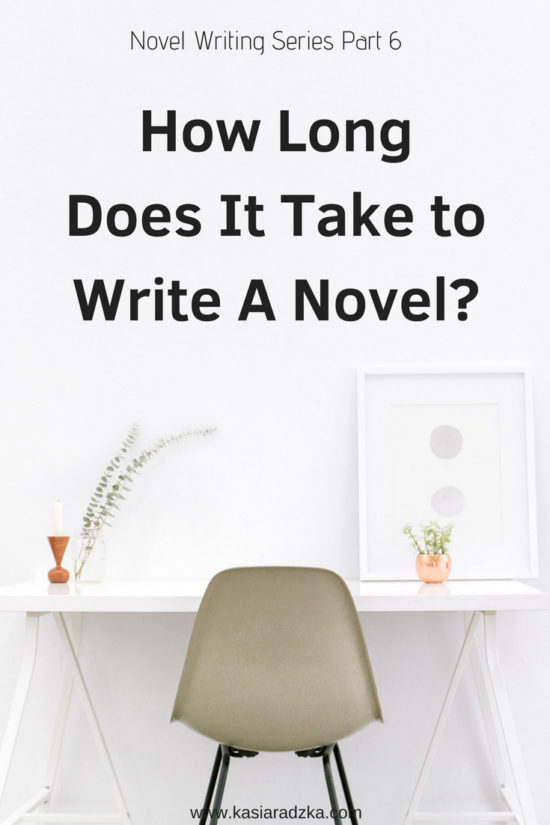
How fast you write a novel comes down to how fast you write your novel.
There are a number of factors that you need to consider. Ask yourself the following questions and they will lead you to your answer.
How much time do you have to write each day?
How fast do you type?
Are you organised with your story?
Have you planned out your scenes?
If you’re aiming for an 80,000-word novel, you write 5 days per week, one hour a day, and 1500 words per hour, and you know your story and scenes, then you could have a novel written in about 10.6 weeks. So, just under 3 months.
I can average about 50 words per minute without too much strain. If I were to write at that pace continuously for one hour, I’d have 3000 words down on the page.
Unfortunately, that sort of pace and output is not realistic every day.
Sometimes one hour of writing can give me that 3000 words, whilst at other times it hovers around 500 words.
I write as fast as I can on my commute to work, and if I’m consistent then I can have a draft finished between 30-45 days.
A draft.
That’s not a finished novel.
After the draft is done you have to consider the different types of editing.
I think that the more books you write, the less editing you end up needing because you start mastering some skills, techniques, and tactics, making the writing process of a novel much smoother.
At the beginning your book might require the following:
- A structural edit
- A copy edit
- A line edit
- Proofreader
- Beta readers
By the time you finish writing your fifth book, you might only need the following:
- A copy edit
- Proofreader
- Beta readers
If you’re really super talented and awesome at self-editing you might get away with just a proofreader and some beta readers.
The fact is, writing a novel is hard work and it’s time-consuming. Just because there are thousands of books being released on Amazon on a weekly basis doesn’t mean that they were easy to write or have given all the editing options a chance.
Writing a novel is more than just about writing a novel. That’s just the beginning.
So even if you’re a speed demon when it comes to typing, it’ll take you four weeks to draft a novel.
- Allow another two weeks for self-editing.
- Another two weeks for an external edit if you’ve got your editor booked in.
- Another week to proofread the book.
- Potentially another two weeks or so to get beta readers feedback.
- A further week to make corrections and proofread.
Three months.
Do it every quarter and you can have four books out in a year.
Easy, right?
Maybe.
It all comes down to the type of quality product you want to produce and how much time you have to commit to writing the novel.
Let’s be honest, someone who has no kids, no job, and zero commitments, has much more time to commit to writing a novel than a single full-time-working mum with four kids under six.
I don’t think it matters how fast your write your novel. What matters is that you get it written.
One thing I have noticed in my own writing process is that I get much more written when I have less time. The difference is, is that I know that I have a limited amount of time and it’s the only time in the day that I can be done.
That means, my brain has been trained that come 6:05 am when I sit on the train, the muse is waiting for me to start putting words to the page.
Day in, day out like clockwork. The words get written.
- Lethal Disposal was written over several years.
- I finished writing Lethal Games in about six months with lots of breaks in between.
- Lethal Instincts took about six weeks to write.
- I drafted an upcoming standalone suspense-thriller in 30 days during NaNoWriMo back in 2008, stewed on the idea for several years, then rewrote it over the course of another 31 days in July.
As you can see, each book took a different amount of time to write. It all depended on the time I had carved out for my writing.
Did you read that last point?
I said, how much time I had carved out for my writing, rather than how much time I had available.
We all have a finite amount of time available to us. It’s how we choose to use it that reflects on what we are able to achieve during this time.
How important is writing a book to you?
If it’s a priority you will make the time for it regardless of your schedule.
As a working mum with a boisterous and cheeky three-year-old, and a dozen responsibilities, I know that if I don’t write on the commute to work, chances are I’m not going to write at all.
Maybe you’re not that lucky to spend an hour or so on the train morning and afternoon to write. That’s fine. Not everyone does.
How about spending 15 minutes writing whilst your kid naps?
What about using half of your lunch break to work on your book?
Maybe you’re an early bird and can wake up an hour earlier?
Night owl? Write when everyone is asleep and go to bed later.
Instead of partying every Friday night, spend a couple of hours working on the novel.
Jot down notes, dialogue, setting as you wait at the doctors, accountants, lawyers, office. Whatever.
It can be done.
You just need to to take responsibility for your time and prioritise.
If you want to write a book, you will, regardless of the amount of time it’s going to take you.
As Nike puts it, Just Do It.
How long does it usually take you to write a novel from start to finished product? Do you procrastinate? Any tips for faster writing?
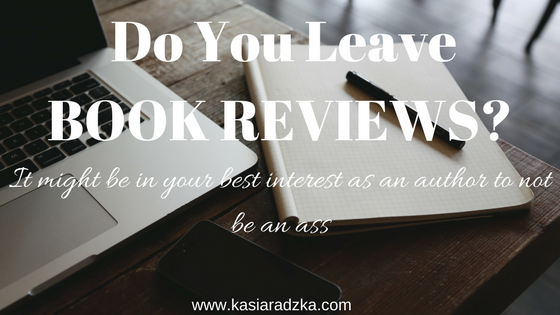
by Kasia | Aug 11, 2017 | Writing
Check out the reviews on Amazon, Goodreads, Kobo and you’ll see a pattern developing. A book with a significant amount of reviews will the majority of the time be faced with 1-star reviews that might comment:
“There was no full stop at the end of the sentence on page 245.”
“The book was predictable because the man and woman lived happily ever after.”
“The fantasy wasn’t realistic.”
“I couldn’t get past page 3.’
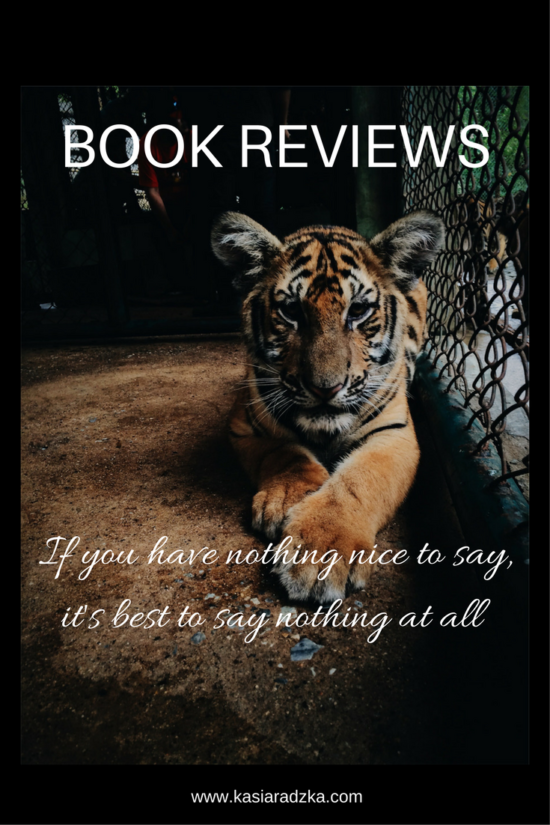
Here are some real dumb ass and hurtful comments I found on Goodreads for well-known authors.
1. “I could not read this. The prose is terrible. Commas are rare. Periods are abundant. I got through one chapter…” Killing Floor (Jack Reacher, #1) by Lee Child
The fact that the reader only got through one chapter he should not be reviewing the book. The fact that he paid $1 a piece might mean that he bought a pirated copy. Besides you’re not reading a book like Killing Floor for literary mastery – it’s entertainment, pure and simple. It was a long book but I enjoyed it.
2. “If I could give this no stars, I would. This is possibly one of my least favourite books in the world, one that I would happily take off the shelves and stow in dark corners where no one would ever have to read it again…” To Kill A Mockingbird by Harper Lee.
The last I heard, To Kill A Mockingbird, is a classic. It’s on my ‘to read’ shelf.
3. “Garbage. Absolutely horrifying, utter trash. A waste of trees, bookshelf space and precious, oh so very fucking precious brain cells…” Fifty Shades of Grey by EL James.
Whoever thought porn for women was ever going to mainstream? Yet EL James sold millions of books, has had the books made into movies, and is rewriting the books from the perspective of the male character. Reviews are subjective. Soz, but unless you’ve made squillions from your writing – keep the nasty to yourself. And even then, didn’t your parents ever teach you to not say anything unless you had something nice to say?
4. “This book is such a steaming pile of shit for so many reasons and hands down the worst book I have ever read….” Gone Girl by Gillian Flynn
And yet it became a motion picture and sold millions of copies.
5. “Recommends it for: no one…” The Secret History by Donna Tartt
This book won literary awards. Not every book is going to be everyone’s cup of tea.
As you can see, not even famous and prolific authors are immune to nasty reviews.
Reviews are a blessing and a curse. If you put your work out there you’re going to get reviewed at some point.
Personally, I won’t leave a review if I think a book is less than 3 stars. I’m happy to say that most of the books I have given a go have been above that.
Why do I only leave a review if I think a book is better than 3 stars?
- I’m an author and I know how sensitive creatives can be. There’s no need for me to publicly shame or hurt someone’s feelings. If I were to see way too many errors in a book then I’d politely email the author to give them a heads up, it would be their prerogative to leave the book as is or fix it. Once upon a time, someone did this for me and I was very grateful.
- There are enough trolls out there that take pleasure in trying to make others feel like shit. If their existence is so dull that they want to take it out on the world, well then, that’s their prerogative and the unfortunate side effect of anonymity on the internet.
- I might not have been the target audience for a book. I can’t comment on the quality of a fantasy or science fiction book because I don’t read too many of them. I love crime, thrillers, non-fiction and some chick lit though so I’m more likely to leave a review on those.
- I simply thought the book sucked. And you know what, I have a right to think that but that doesn’t mean that I have to share it publicly. If anyone asks my opinion I can give them an honest review but the things you write on the internet are going to stay there forever. I don’t want to create any bitter feuds with fellow authors or readers. Just because I don’t like the book, doesn’t make it a bad book.
- Writing is tough and wonderful at the same time. I know how hard and time-consuming it is to write a book. If you’ve made the sacrifices in your hectic schedule to pen a novel, be it genre fiction, literary or nonfiction, I salute you. If I can, I want to pull you up not push you down.
I hope that when someone reviews the books that they read that they too consider these points. Leaving nasty reviews is not conducive to any art form.
However, that doesn’t mean you can’t leave a one or two-star review. You can, just make sure that your comments lean towards the constructive rather than the malicious.
The same goes for beta readers. It’s possible to be critical without being nasty. Check out this piece I found on being a better beta reader –> How to be a better beta reader, and stop being an asshole
I’ve had people tell me that my books are good, great and not so good, just by the expression on their faces. They have a right to think any of those things.
As an author and a reasonable woman (one hopes!), I decide how I’m going to feel about their reviews and what the consequences will be. I also know that not everyone is going to love my books – even my mum is happy to tell me what she doesn’t like in my books! And that’s ok.
Because I have one major goal when I write a book:
To make each book better than its predecessor.
I hope that fellow authors have a similar goal.
This is the only thing we have control over, so we might as well work on improving our efforts to reduce the risk of bad reviews. The key word is to ‘reduce’ not eliminate. Thanks to trolls, we’ll never eliminate negative reviews.
I feel the same way when I run or do a triathlon. With each race I want to improve my performance whether that would be to finish in a better time, run a negative split (second half faster than the first), feel better when I finish, improve my technique. These are all little things that make a difference.
Writers need to be aware of similar improvements in their writing. It’s not just about how much money they’ll make or reviews they’ll get.
-
It’s improving their vocabulary and using the language in a more clever way.
-
It’s adding vibrancy to the setting with each story they write.
-
It’s about creating more realistic dialogue and making the characters in each book sound unique.
Sometimes the little things can make a huge difference.
By focusing on improving vocabulary, technique, setting, description, characters, and plot, authors will improve automatically on the entire package. The result will be a better book each time.
Yes, it’s important to write an entertaining book with no loose ends. Both grammar and spelling are important too. Your book needs editing regardless of what your mother, best friend, husband, next-door-neighbour thinks.
Regardless of how good your book is, even if it reaches the New York Times Bestseller list, you will be faced with negative reviews – sometimes for no reason at all.
-
If you can’t deal with it, don’t put your work out there.
-
Got a bad review? Don’t defend yourself because you will only make it worse.
-
If you leave a review, make it a positive one.
As you continue improving your stories you will slowly start growing a fan base. It might happen from book one, it might from book five.
Write for the right reasons and make sure you enjoy the process. It’s the only thing that you control. You can’t make readers love your books. So aim to write the best book you possibly can, then rinse and repeat.
Don’t worry about what others are doing. Write your own book, support your fellow authors, and hope that they will return the favour.
One thing I’ve noticed though is that you’re more likely to get bad reviews from trolls who are either too scared to publish their works, have received unfavourable reviews of their own, or want to crush your spirit to make themselves feel better.
You have zero control over that. The only control you have is not becoming one of them.
Regardless, bad reviews are part of a writers’ life.
Deal with it. Then move on.
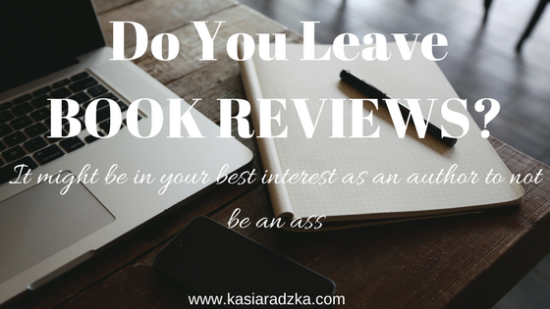
6 Quick Tips For Leaving Book Reviews
1. Think before you hit publish. How would you really feel if you were the recipient of the review you’re about to post?
2. Is your review helpful to the author or reader? If it’s not, don’t post it.
3. Are you a fan of the genre? If you don’t normally read the genre you probably shouldn’t be posting a review.
4. Yes, you’re entitled to your opinion but doesn’t mean that the world is entitled to yours – especially if you’re trying to be hurtful. Think how you would feel if someone gave that review to your child for example?
5. Don’t lie just to make someone feel better. I hope that when friends read my books and leave a review that they are being honest. I’m not going to get upset if they don’t leave a review because they didn’t like it or give me three stars instead of five. I’ll value their honesty much more if they don’t bullshit me.
6. Have you actually read the book? You shouldn’t be leaving reviews if you’ve only read half the book.
–> Are You Naughty Or Nice When Writing Book Reviews? <–
Reviews are a necessary evil for a writer. Sometimes they will lift your spirits, other times they will sting like a knife to the heart.
The only thing you can do is treat other writers with the respect that you want to be treated with. Nothing less, nothing more.
And go write the best book you can!
Remember, as a writer you have the power to share and transform the world with your words. Make sure that your legacy as a writer, is a positive one.
Happy Writing & Reading!
What are your thoughts on book reviews?
Have you ever received a scathing review or given one in return?

by Kasia | Aug 9, 2017 | Writing
Another quarter has flown by. Three months are done and dusted. I’ve heard people starting the countdown to Christmas which has left me a little concerned. Here in Australia, it’s also the end of the financial year so the joys of tax time have arrived.

The past three months have been exhausting, stressful and not as productive as I hoped. But when you pile a crap-load on your plate – work, parenting, study, writing a book, training for a marathon and building a house – well, it’s no surprise that shit may hit the fan, you might get run down, and well that productivity schedule might as well be scrunched up and thrown in the trash.
On the upside, Lethal Games is AVAILABLE ON AMAZON, KOBO and SMASHWORDS!
I’m excited!
It’s Book 4 in the Lexi Ryder Crime Thriller series, and I can’t wait for you to read it.
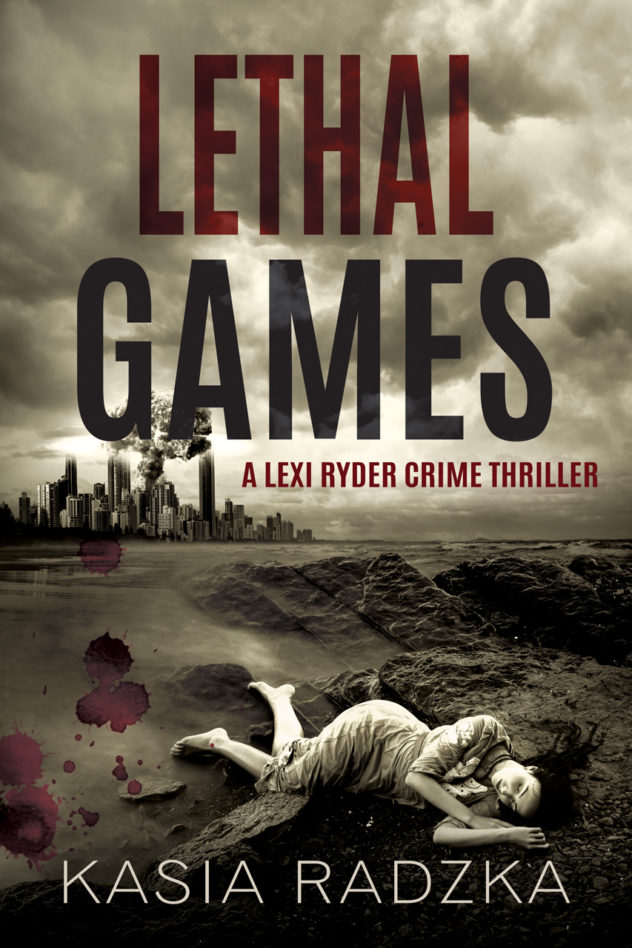
Lexi Ryder is moving on. She’s putting her life back together after the public ordeal with her family and keeping Matt happy by staying out of trouble. At least that’s what she intends for it to look like. But behind the scenes, she’s not willing to stop investigating the stories that really matter.
When her investigation finds her embroiled in a dangerous game that poses a threat to the entire country. She has no choice but to get involved, even if it means risking her life and her future with Matt.
This time Lexi is in for more than she bargained for. It’s no longer about seeking justice for one person but preventing a national disaster.
When enemies become allies, trust is a commodity hard to come by.
And there’s still Avery Stone. Will he end up being her saviour or her demise?
You can get Lethal Games from the following online book stores:
AMAZON
KOBO
SMASHWORDS
If you’ve read any of my books and enjoyed them, then please take a moment to leave a review. It’s the best ‘thanks’, you can give an author.
Given that I’m posting the update so late, I’m happy to say that I’m releasing a box-set with the four Lexi Ryder Crime Thriller books available as one package. Currently available for pre-order for only 99c. The price will be going up to $4.99 shortly. So grab yours for the low price of 99c before mid-August!

The box-set is available for pre-order for 99c until the 14 August 2017. You can get it from,
AMAZON
KOBO
SMASHWORDS
HOLIDAY FUN
I did manage a family holiday in amongst the business. It was our second time in Fiji and as expected it was fantastic minus a chest cough I had to deal with.
BOOK SALES AND GIVEAWAYS
Once again I managed to do zero marketing this quarter. I didn’t see the point in investing the time and money when I couldn’t put in a hundred percent into my efforts. No point in doing a half-assed job on it and expecting decent results.
The first book in the Lexi Ryder Crime Thriller Series is currently perma-free on Amazon, Kobo & Smashwords. You can get it here –> AMAZON , KOBO ,KOBO , SMASHWORDS.
The only marketing that I’ve done is some Twitter posting.
Lethal Instincts is getting downloaded a few times a day which is great.
Sales are a slow trickle but that’s no surprise as I’ve put no emphasis on marketing my books. This will change next quarter as I want to start building my email list and selling more books!
FREELANCING & SIDE HUSTLES
Zero. Nada Zilch.
BLOGGING
I’m working on redesigning my website. A few ideas are bobbing around in my head at the moment and I’m trying to put them together in a coherent form.
OMG, HTML, you’re a foreign language!
ON MY BOOKSHELF
I’ve set a goal to read 78 books this year. It’s been a slow start but here are some of the books that I’ve read over the past three months.
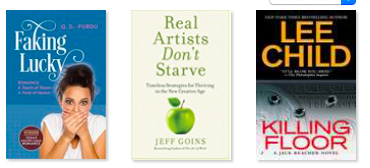
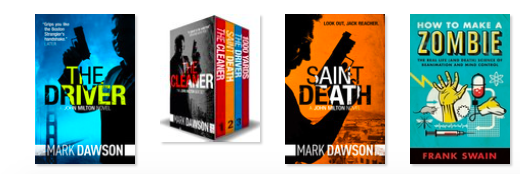

Do you have Goodreads? We should connect!
What is your definition of success?
I’ve been thinking about that the past few days. Success. How can I define what success really means?
It all depends on the day, week, month, year.
For 2017, my definition of success is evolving. At the present time, it means releasing four books.
I’m happy to say that I’m halfway there.
GOALS FOR NEXT QUARTER (JULY – SEPTEMBER)
Last quarter I set some hefty goals. They weren’t all going to get achieved. Not with my busy schedule and a million and one things to get organised. Certain activities can be mentally draining and trying to sit down after a tough day to write and continue using your brain becomes impossible. Often a run or a HIIT workout helps to push through but sometimes you just need to put your head on the pillow and sleep.
Time is a limited commodity that most of us take for granted. But if we want something bad enough, we’re going to make the time to get it done.
1 – Start being active with marketing
2 – Finish writing and editing my stand alone suspense/thriller – As Darkness Falls (working title only)
3 – Complete draft of Mystic Creek – my take on a supernatural/urban fantasy story
How’s your year travelling? Are you close to meeting your goals for the year?
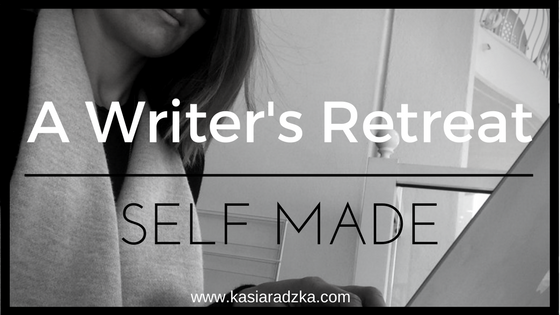
by Kasia | Jul 11, 2017 | Writing
Two days and two nights of writing, editing, and reading…and wine. What more could a writer want?
I’ve been planning a writer’s retreat for over a year now. Thinking about it. Mulling the idea over in my head. Talking about it. Then I realised:
Just do it.
When you’re a mum going away for the weekend on your own to just write seems selfish. Hell, I felt guilty. For just a moment. And whilst I missed my little munchkin like crazy, I would do it again in a heartbeat…just not tomorrow.

Why Bother With A Writer’s Retreat?
Our days are filled with routines and responsibilities, distractions and excuses. It’s too easy to make and break plans for your writing unless you are super strict with your prioritising.
My key writing time is on the commute to and from the day job and after my son goes to bed. But the commute is the most reliable. Weeknights are exhausting, especially after having spent two and a half hours on the train and eight hours in the office. Often, the last thing you want to be doing is turning on the computer again.
The main benefit of a writer’s retreat is the ability to focus solely on writing. You get two days where all you have to do is write, read and edit. Meals and bathroom breaks are optional but highly recommended.
When you’ve dedicated a weekend to just writing, and as in my case paid for an apartment to really getaway, you become more motivated to get shit done and ignore any urges to procrastinate.
The only thing I procrastinated about was heading to the gym before lunch. I made it after much deliberation. As a writer, you need a break to keep the creative juices flowing and you need to move your butt. Sitting is not conducive to good health or fitting into skinny jeans.
The thirty-minute run made my afternoon equally as productive as my morning.
How Do Can You Make Your Own Writer’s Retreat Work?
* Have a plan
Putting a plan in place is integral. If you don’t have your objectives set out for your writer’s retreat then you’re going in blind and more likely to, (a) procrastinate; (b) get frustrated; (c ) be less productive.
A good plan will ensure that you get shit done in a timely fashion.
I made a list of all the things I wanted to achieve before embarking on my solo writer’s retreat.
Naturally, I overestimated how much I could actually get done and didn’t really account for the planned distractions.
There’s only so long that you can be crammed into a holiday apartment. Whilst the views were great and my writing flowed, my brain needed a break.
So I booked dinner with friends on one night. It was meant to be an early night but I didn’t end up getting back to the apartment till after 11 pm which meant the chances of waking up at 5ish the following morning to go for a run, have breakfast and start writing by 7 were not going to happen.
Yes, I planned out for each hour of the day from the moment I woke up to the moment my head hit the pillow at the end of the day, which brings me to the next point.
* Be Flexible
Flexibility is a must for a writer, especially when you’ve booked yourself away and expect your muse to show up at your beck and call.
Unfortunately, the muse has a mind of its own.
Sometimes it comes freely, sometimes you need to push and pull in the direction that you want for the creative juices to start flowing.
I have three projects on the go. Which means that if one wasn’t flowing I could jump to the next one. I had the plan in place where I worked for an hour to an hour and a half on each in the morning, then repeated the process in the afternoon.
It worked for me. I got a lot done.
* No Pressure
Pressure can be a help and a hindrance.
Whilst I had a plan and flexibility I placed no pressure on myself to get everything done. I knew that all the things I planned weren’t going to be achieved. There’s only so much you can do in two days.
Your brain will need a break. Whether that’s after an hour or eight hours will depend on you and your habits.
I can sometimes work for hours straight. Then there are days that I can’t hold my attention on one thing for more than ten minutes.
Using a timer for each task helped stay focused and relieved the pressure.
I wasn’t strict with it though. If the words were flowing I’d continue for a little bit longer.
* Treat yourself
Buy your favourite bottle of wine or organise to go out to a nice restaurant in the evening as a reward for the hard work that you’ve put in. You deserve it.
For each task you complete, give yourself a mini reward. It could be as simple as refilling your coffee cup or taking a break for lunch.
Or get creative and reward yourself with a new book from Amazon, a quick dance around the living room, or the time to watch an episode of your favourite tv series.
* Dress nicely
Avoid the tracksuit and jumper.
You want to feel good when you write.
Stepping out for breakfast before your writing day starts will help you make the effort. It’s well worth it.
I don’t know about you, but I get little done in my tracksuit unless it involves cleaning or working out.
* Have fun
Fun is important here. This is your weekend. You’re doing watch you love without interruption unless you want it.
Make it what you want it to be.
Grab a book that you’ve wanted to read. Play music. Watch a movie. Listen to a podcast.
Enjoy the process and the experience.
* Lose The Internet Connection
The internet is a time waster. It’s so easy to search for a word or piece of research only to find that an hour has passed because you couldn’t help yourself but check all your social media accounts and get lost in conversation about the differences between the comma and full stop. Ok, I’m sure you’re talking about more riveting stuff than that.
But the internet will kill your productivity.
I was glad there was no free wifi where I was staying. The only internet connection was on my phone. I used it for about half an hour during my stay.
It was awesome.
What Can You Do During Your Writer’s Retreat?
A writer’s retreat is filled with endless possibilities. You can focus on just the writing, or just editing or a combination of the two. I’m certain you’ll include reading in there too, you are a writer after all.
* Play catch up
Is there a project that you’re running behind on? Focus on catching up to where you want to be. Set the timer for an hour and get as much done as possible.
It’s amazing how much you can get done in sixty minutes.
* Get out of your comfort zone
Bring some writing exercises and take a few minutes here and there to challenge your writing muscles.
Focus on your weaknesses and you never know, they might just become your strengths by the end of the weekend.
* Set a word limit
Have you ever wondered how some writers manage an output of 5,000 or even 10,000 words in a day?
Yeah, I wish I could do that too.
Your writer’s retreat is the perfect time to challenge those writing muscles and aim high.
How many words can you write in an hour? If the words are flowing then I can write anywhere between 1500-2000 words. If they’re not, then it’s more like 500-1000.
So in an eight hour day, I could write between 4,000 and 16,000 words.
Hahaha, yes, I’m laughing too.
With that range, 10,000 would be an achievable goal to write in one day, or over course of the weekend.
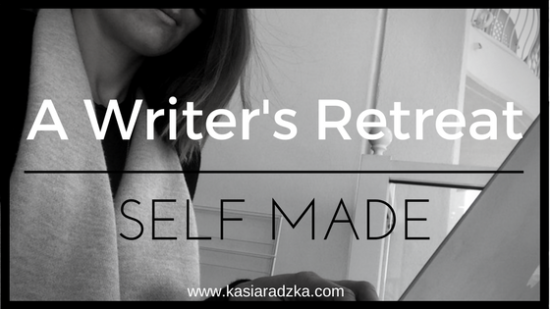
What Worked, What Didn’t, & What I’d Do Different
I loved my solo writer’s retreat and I’m so glad I did it. It was productive, relaxing and fun.
Whilst I didn’t get everything done – there aren’t enough hours in the day! I got the most important things done, including:
* Finished the proofs on my new book, Lethal Games.
* Rewrote about 10,000 words in a standalone thriller I’m working on
* Wrote a long world building chapter for my urban fantasy novel
* Drafted and edited two blog posts
* Started reading How To Market A Book (Third Edition) by Joanna Penn
* Watched zero television
* Caught up with friends I hadn’t seen in ages
* Relaxed more than I thought I would
Having a plan whilst being flexible with the weekend worked well. I knew what I wanted to achieve and I got it done.
Breaking down the day into chunks was effective too. I didn’t have a chance to burn out with one story because I was changing project focus every 60 to 90 minutes.
The only other thing I’d have done different is not to plan any social catch ups in the evenings. It was nice and it did break up the monotony of working but it also ate into the time that I had to focus on writing.
I’m definitely going to do this again.
A solo writers’ retreat is a great way to jump start your writing or reignite the writing flame.
I only wish I’d done it sooner.























